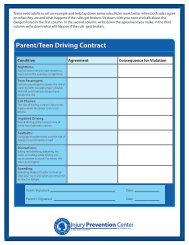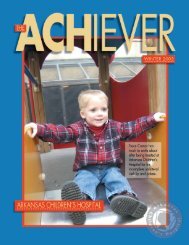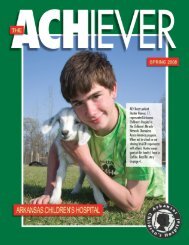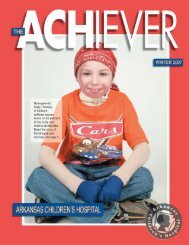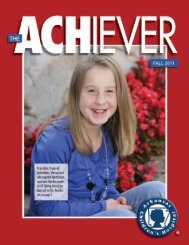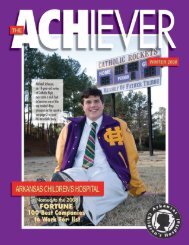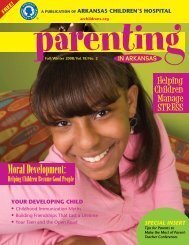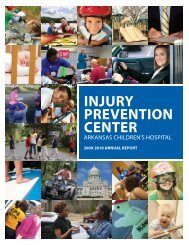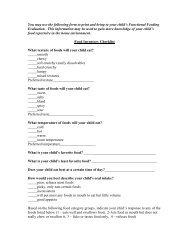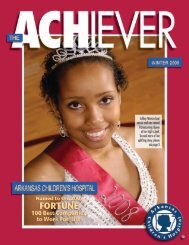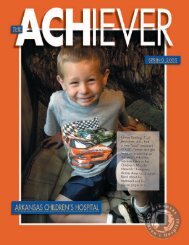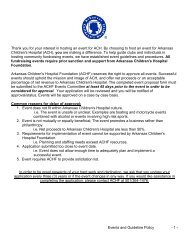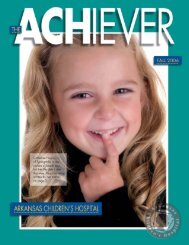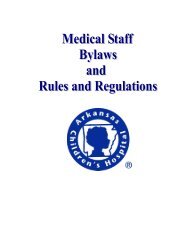Summer 2007 - Arkansas Children's Hospital
Summer 2007 - Arkansas Children's Hospital
Summer 2007 - Arkansas Children's Hospital
- No tags were found...
Create successful ePaper yourself
Turn your PDF publications into a flip-book with our unique Google optimized e-Paper software.
RESEARCHACHRI Research isTreating Pain,Tracking Impact■ John GreganThe cry of a child stirs the emotions of anybody in earshot.When the suffering child is a premature baby, hearts and thoughtsgo out to the tiny newborn.Invasive machinery and various medical procedures are neededto keep these children alive and growing, separating them fromtheir mothers. There is no maternal touch, only clinical forms ofstimulation. Without a calming connection, the most vulnerable ofpediatric patients are exposed to increasing stress or pain. Thealternative to is alleviate the pain by using powerful drugs — acontroversial and difficult choice.In June 2000, Laura Anderson was faced with this choice fornot just one child, but for two premature babies.“I had an emergency C-section,” she recalls. “Cameron andCarlie were born at 27 weeks, and neither had lung development.They were just so small, 2 pounds, and they needed respirators.”At this time, the two babies were enrolled in a neonatal painstudy. Babies in the study were given either morphine to controlpain or a placebo. The study explored questions about babies treatedwith painkillers: Would stress decrease? Would survival increase?Would conditions such as cerebral palsy, cognitive delay and bleedingin the brain decrease?Remembering the first time she saw her children, Laura says,“Cameron was telling it; he was loud. Carlie was out of it: quiet,calm, still.”During their two months at ACH, the babies grew stronger.“Cameron was strong enough to pull out his tube three or fourtimes, but he wasn’t strong enough to breathe without the tube,”his mother says. “Staff members at ACH cared about the kids andwere considerate of the kids’ and parents’ feelings. They explainedeverything to us.”Cameron and Carlie were among the children involved in theNEurologic Outcomes and Preemptive Analgesic In Neonates(NEOPAIN) study — the study of pediatric pain management innewborns. Dr. Sunny Anand* directed this National Institutes ofHealth-funded research project centered at ACH. It involved 16centers (12 in the US and four in Europe) from 1999 to 2002.The study revealed a decreased pain response in babies receivingmorphine but did not show a change in effects such as brain damage.Some of the babies with higher morphine doses had sideeffects similar to those of adults using morphine — a fact not previouslydocumented for premature babies.Five years later, NIH has agreed to fund a follow-up study tobegin later this year on the babies in the NEOPAIN study. Themain objective is to learn the long-term impact on the babies, nowCameron and Carlie Anderson, now 7, are vibrant andhealthy as they jump on a trampoline. Thanks toresearch like that of Dr. Sunny Anand, children likeCameron and Carlie have better hope for the future.ages 6 to 8. At age 8, Dr. Anand’s team will give these childrenoutpatient tests regarding behavior, cognition, stress response,executive brain function, growth, vision, hearing and visualmotorcoordination.“Science continues to push the boundaries of understanding.Facts that were accepted as dogma in years past, suchas ‘babies do not feel pain, and it has no long term effect,’ arebeing questioned again,” says Dr. Richard F. Jacobs*, presidentof <strong>Arkansas</strong> Children’s <strong>Hospital</strong> Research Institute (ACHRI).“Dr. Anand’s work is key to opening those doors of scientificunderstanding of pain in babies and whether or not there areeffects from those experiences. It could potentially impact severalareas of neonatal medicine and how we manage babies inthe future.”In preparation for the follow-up study, Dr. Anand has conductedpreliminary studies with 20 local patients from the originalstudy. Cameron and Carlie have each returned to ACH forthis testing. Dr. Anand’s initial results show that NEOPAINchildren who received morphine may have increased cognitionand behavior scores compared to children who received theplacebo. He hopes to learn if there are differences later in life,with increased IQ or decreased atypical behaviors among prematurebabies receiving analgesia.The treatment of Laura’s family was only one influence in herdecision to enroll her children in the follow-up and in anyfuture studies.“Most of all,” she states, “The more research, the more wecan learn. If it will help anybody else you know, you don’tmind.”*Kanwaljeet J.S. “Sunny” Anand, MBBS, D. Phil, FAAP, FCCM,FRCPCH, is a physician in critical care medicine at ACH; holdsthe Morris & Hettie Oakley Endowed Chair of Critical CareMedicine; is a professor in the UAMS departments of pediatrics,anesthesiology, pharmacology, neurobiology and developmentalsciences; and is director of the ACHRI Pain NeurobiologyLaboratory.*Richard F. Jacobs, M.D., FAAP, is president of ACHRI, physicianin pediatric infectious disease at ACH, the Horace C. CabeProfessor of Pediatrics and the interim chairman of the departmentof pediatrics, UAMS College of Medicine.6



